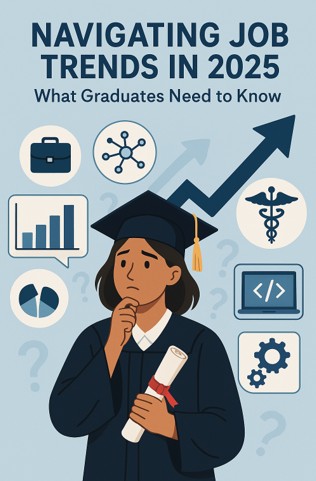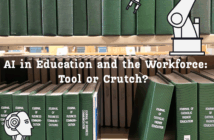By Hosanna Asfaw, Contributing Writer
Graduation season is upon us. You might be thinking: “All that money spent on school has to be worth it. I need to find a job—but will I? Am I even ready? I don’t feel qualified. What can I do to make this easier?” These questions are likely racing through your mind as you prepare to take your next step.
According to the New Jersey Business & Industry Association, 72 percent of all jobs will require postsecondary education or training by 2031. Of those, 42 percent will require at least a bachelor’s degree.
While demand for tech roles—such as data scientists, software developers, and IT specialists—continues to rise, fields like healthcare, law, finance, and accounting remain strong. Even in non-tech industries, employers increasingly value digital literacy and leadership skills, especially in project management and consulting.
Additionally, cross-sector overlap is also creating new opportunities, with data science playing a growing role in both medicine and business.
So, what are the best jobs in the United States?
There’s no one-size-fits-all career, but the most rewarding roles often share a few key qualities: competitive salaries, meaningful challenges, opportunities for advancement, manageable stress levels, and a healthy work-life balance.
According to U.S. News & World Report, while the highest-paying jobs include CEOs, medical specialists, nurse anesthetists, and pilots—each earning an average salary of more than $200,000—the top 10 best jobs in the United States that require a bachelor’s degree, ranked from lowest to highest, are: pilot, financial advisor, marketing manager, actuary, data scientist, medical and health services manager, information security analyst, software developer, financial manager, and IT manager.
Understanding how your degree aligns with the evolving job market is crucial. For specialized degrees like accounting, the career path—such as becoming an accountant or auditor—is straightforward.
In contrast, broader, interdisciplinary degrees—like international studies or medical humanities—span multiple sectors, making job opportunities less defined. This is where adaptability and curiosity become essential. Your diverse background can be an asset in industries where skills overlap, opening doors to unexpected, yet fulfilling, career paths.
Interestingly, even in the age of artificial intelligence (AI), many experts agree that, at present, AI is not ready to replace jobs but rather to complement them.
According to research from Georgetown University, technology has increased the number of jobs, and this trend is expected to continue. Even in the context of job automation, it’s likely that only certain aspects of jobs will be automated, not entire roles. Therefore, technology may replace tasks in jobs, but not the occupations as a whole.
Positions that don’t require a degree, such as truck drivers and retail sales, remain in demand. However, as AI develops and more individuals earn degrees, standing out in the job market becomes increasingly competitive. This is why developing both hard and soft skills is crucial.
While AI can automate tasks, it still lacks genuine emotional intelligence, ethical reasoning, and the ability to build meaningful relationships. To stay competitive among other graduates, pursuing certifications that demonstrate technical expertise—such as the PMP for project management or the CFA for finance—can make you a stronger candidate.


An emerging trend is that many professionals find themselves working in fields completely unrelated to their degrees, yet still experience career satisfaction, new challenges, and good compensation.
For example, individuals with a background in public health may transition into development or international relations roles. Employers recognize this flexibility, and as a result, job descriptions often indicate openness to candidates with diverse educational backgrounds.
Particularly in humanities, management, consulting, and human resources, employers look for candidates who are teachable, hard-working, and determined enough to initiate and complete tasks successfully. They value the critical thinking, communication, and analytical skills that graduates bring.
Career-building is not always linear. You may discover a new passion or opportunity at any point that reshapes your professional path. Soft skills are transferable across industries, and they will always be valuable, no matter where your journey takes you.
Key takeaways for career success from Saint Leo University professors Dr. Kelly Atkins, Dr. Dean Passard, Dr. Karen Hannel, Dr. Okey Azu Igbonagwam, and Ms. Katrina Weicht include:
- Be competent. Be qualified. Let your work speak for itself, and earn certifications if needed.
- Practice lifelong learning. Stay current by developing technical skills, and pay attention to how AI is being integrated into the workplace.
- Advocate for yourself. Don’t let imposter syndrome hold you back. Everyone has to start somewhere.
- Focus on soft skills. Leadership, communication, and teamwork remain essential across all industries.
- Networking matters. Build relationships now—you’ll be able to lean on them in the future.
- Embrace challenges as opportunities. Stay confident, seize chances, and build connections. They might open doors you never expected.
The unknown can be nerve-wracking. Many of us are eager to see the outcomes of our efforts, and we often hope life will unfold according to a perfect plan—each milestone achieved on schedule. But life rarely goes exactly as expected. It throws curveballs, setbacks, and surprises.
Adapt, move forward, and when you fail (because let’s face it, we all do), pick yourself up. Look to your mentors and community for support, reflect on what you’ve learned, and rebuild yourself stronger.
To all graduates: Congrats! No matter what comes next, stay excited and keep pushing forward.






1 Comment
Great article, I will definitely be using these methods when applying to internships!